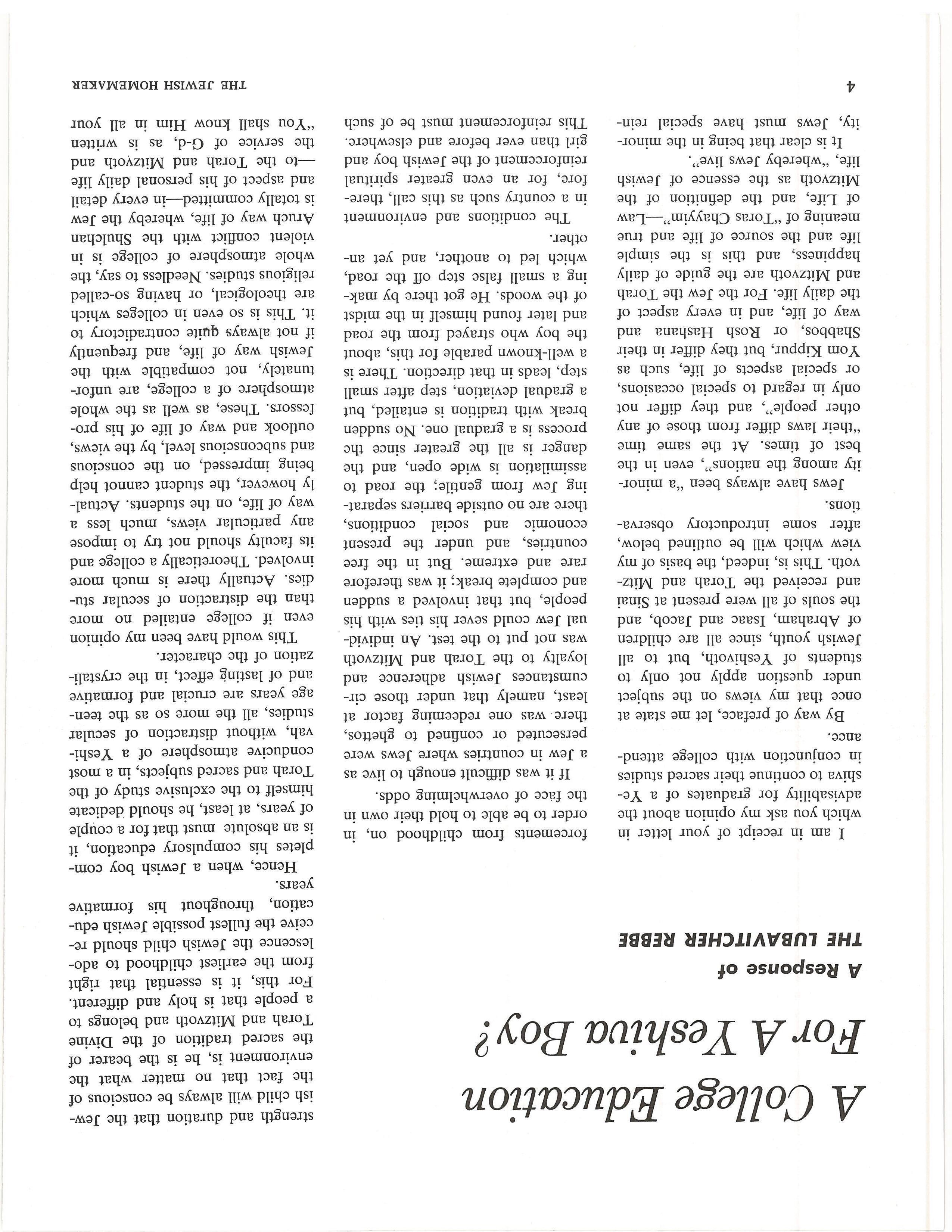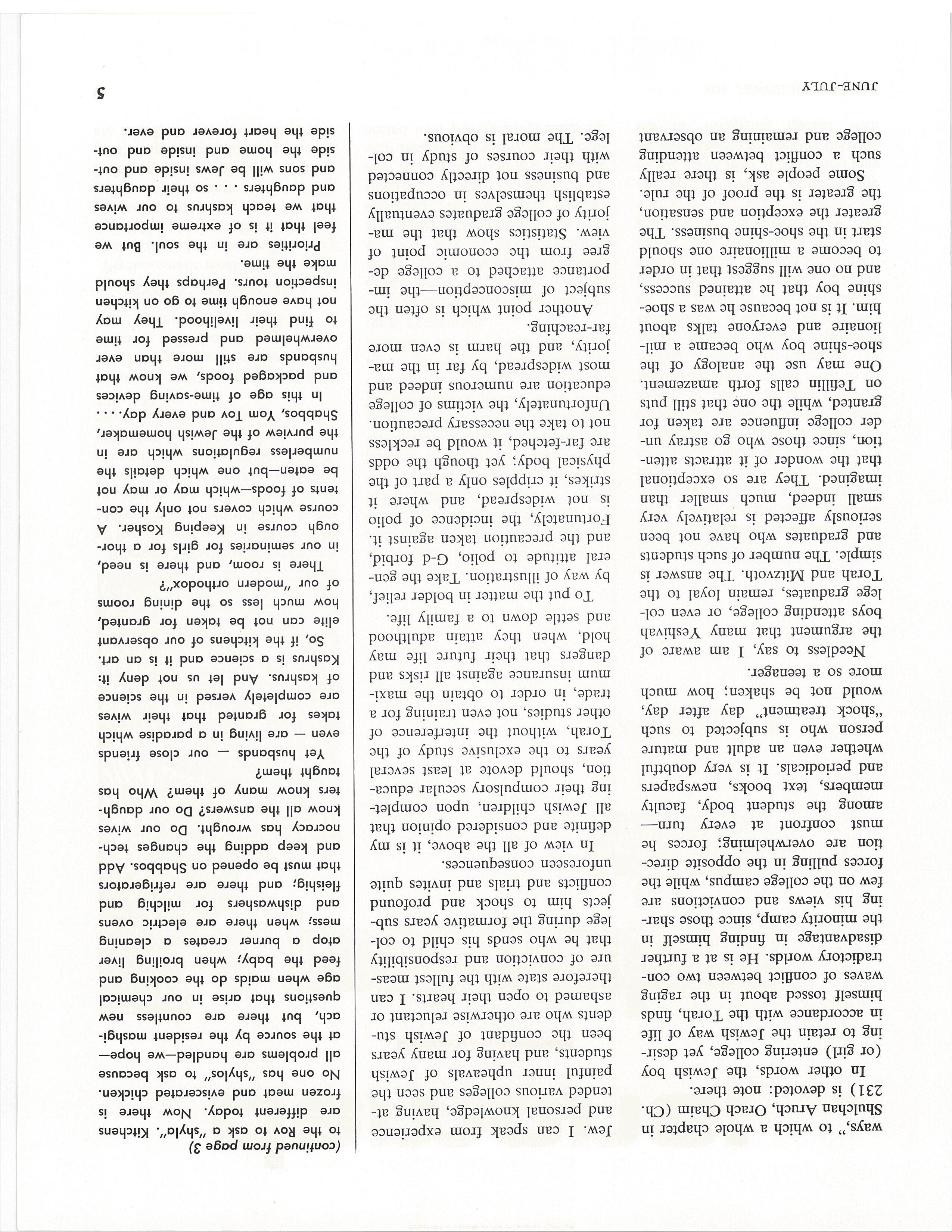
7 minute read
A College Education ForA Yeshiva Boy? A Response of THE LUBAVITCHER REBBE
I am in receipt of your letter in which you ask my opinion about the advisability for graduates of a Ye shiva to continue their sacred studies in conjunction with college attend ance.
By way of preface, let me state at once that my views on the subject under question apply not only to students of Yeshivoth, but to all Jewish youth, since all are children of Abraham, Isaac and Jacob, and the souls of all were present at Sinai and received the Torah and Mitz voth. This is, indeed, the basis of my view which will be outlined below, after some introductory observa tions.
Advertisement
Jews have always been “a minor ity among the nations”, even in the best of times. At the same time “their laws differ from those of any other people”, and they differ not only in regard to special occasions, or special aspects of life, such as Yom Kippur, but they differ in their Shabbos, or Rosh Hashana and way of life, and in every aspect of the daily life. For the Jew the Torah and Mitzvoth are the guide of daily happiness, and this is the simple life and the source of life and true meaning of “Toras Chayyim”—Law of Life, and the definition of the Mitzvoth as the essence of Jewish life, “whereby Jews live”.
It is clear that being in the minor ity, Jews must have special rein- forcements from childhood on, in order to be able to hold their own in the face of overwhelming odds.
If it was difficult enough to live as a Jew in countries where Jews were persecuted or confined to ghettos, there was one redeeming factor at least, namely that under those cir cumstances Jewish adherence and loyalty to the Torah and Mitzvoth was not put to the test. An individ ual Jew could sever his ties with his people, but that involved a sudden and complete break; it was therefore rare and extreme. But in the free countries, and under the present economic and social conditions, there are no outside barriers separat ing Jew from gentile; the road to assimilation is wide open, and the danger is all the greater since the process is a gradual one. No sudden break with tradition is entailed, but a gradual deviation, step after small step, leads in that direction. There is a well-known parable for this, about the boy who strayed from the road and later found himself in the midst of the woods. He got there by mak ing a small false step off the road, which led to another, and yet an other.
The conditions and environment in a country such as this call, there fore, for an even greater spiritual reinforcement of the Jewish boy and girl than ever before and elsewhere. This reinforcement must be of such strength and duration that the Jew ish child will always be conscious of the fact that no matter what the environment is, he is the bearer of the sacred tradition of the Divine Torah and Mitzvoth and belongs to a people that is holy and different. For this, it is essential that right from the earliest childhood to ado lescence the Jewish child should re ceive the fullest possible Jewish edu cation, throughout his formative years.
Hence, when a Jewish boy com pletes his compulsory education, it is an absolute must that for a couple of years, at least, he should dedicate himself to the exclusive study of the Torah and sacred subjects, in a most conducive atmosphere of a Yeshi vah, without distraction of secular studies, all the more so as the teen age years are crucial and formative and of lasting effect, in the crystali zation of the character.
This would have been my opinion even if college entailed no more than the distraction of secular stu dies. Actually there is much more involved. Theoretically a college and its faculty should not try to impose any particular views, much less a way of life, on the students. Actual ly however, the student cannot help being impressed, on the conscious and subconscious level, by the views, outlook and way of life of his pro fessors. These, as well as the whole atmosphere of a college, are unfor tunately, not compatible with the Jewish way of life, and frequently if not always quite contradictory to it. This is so even in colleges which are theological, or having so-called religious studies. Needless to say, the whole atmosphere of college is in violent conflict with the Shuichan Aruch way of life, whereby the Jew is totally committed—in every detail and aspect of his personal daily life —to the Torah and Mitzvoth and the service of G-d, as is written “You shall know Him in all your ways,” to which a whole chapter in Shuichan Aruch, Orach Chaim (Ch. 231) is devoted: note there.
In other words, the Jewish boy (or girl) entering college, yet desir ing to retain the Jewish way of life in accordance with the Torah, finds himself tossed about in the raging waves of conifict between two con tradictory worlds. He is at a further disadvantage in finding himself in the minority camp, since those shar ing his views and convictions are few on the college campus, while the forces pulling in the opposite direc tion are overwhelming; forces he must confront at every turn— among the student body, faculty members, text books, newspapers and periodicals. It is very doubtful whether even an adult and mature person who is subjected to such “shock treatment” day after day, would not be shaken; how much more so a teenager.
Needless to say, I am aware of the argument that many Yeshivah boys attending college, or even col lege graduates, remain loyal to the Torah and Mitzvoth. The answer is simple. The number of such students and graduates who have not been seriously affected is relatively very small indeed, much smaller than imagined. They are so exceptional that the wonder of it attracts atten tion, since those who go astray un der college influence are taken for granted, while the one that still puts on Tefillin calls forth amazement. One may use the analogy of the shoe-shine boy who became a mil lionaire and everyone talks about him. It is not because he was a shoe shine boy that he attained success, and no one will suggest that in order to become a millionaire one should start in the shoe-shine business. The greater the exception and sensation, the greater is the proof of the rule.
Some people ask, is there really such a conflict between attending college and remaining an observant
Jew. I can speak from experience and personal knowledge, having at tended various colleges and seen the painful inner upheavals of Jewish students, and having for many years been the confidant of Jewish stu dents who are otherwise reluctant or ashamed to open their hearts. I can therefore state with the fullest meas ure of conviction and responsibility that he who sends his child to col lege during the formative years sub jects him to shock and profound conflicts and trials and invites quite unforeseen consequences.
In view of all the above, it is my definite and considered opinion that all Jewish children, upon complet ing their compulsory secular educa tion, should devote at least several years to the exclusive study of the Torah, without the interference of other studies, not even training for a trade, in order to obtain the maxi mum insurance against all risks and dangers that their future life may hold, when they attain adulthood and settle down to a family life.

To put the matter in bolder relief, by way of illustration. Take the gen eral attitude to polio, G-d forbid, and the precaution taken against it. Fortunately, the incidence of polio is not widespread, and where it strikes, it cripples only a part of the physical body; yet though the odds are far-fetched, it would be reckless not to take the necessary precaution. Unfortunately, the victims of college education are numerous indeed and most widespread, by far in the ma jority, and the harm is even more far-reaching.
Another point which is often the subject of misconception—the im portance attached to a college de gree from the economic point of view. Statistics show that the ma jority of college graduates eventually establish themselves in occupations and business not directly connected with their courses of study in col lege. The moral is obvious.
(continued from page 3) to the Roy to ask a “shyla”. Kitchens are different today. Now there is frozen meat and eviscerated chicken. No one has “shylos” to ask because all problems are handled—we hope— at the source by the resident mashgi ach, but there are countless new questions that arise in our chemical age when maids do the cooking and feed the baby; when broiling liver atop a burner creates a cleaning mess; when there are electric ovens and dishwashers for milchig and fleishig; and there are refrigerators that must be opened on Shabbos. Add and keep adding the changes tech nocracy has wrought. Do our wives know all the answers? Do our daugh ters know many of them? Who has taught them?
Yet husbands our close friends even are living in a paradise which takes for granted that their wives are completely versed in the science of kashrus. And let us not deny it: Kashrus is a science and it is an art.
So, if the kitchens of our observant elite can not be taken for granted, how much less so the dining rooms of our “modern orthodox”?
There is room, and there is need, in our seminaries for girls for a thor ough course in Keeping Kosher. A course which covers not only the con tents of foods—which may or may not be eaten—but one which details the numberless regulations which are in the purview of the Jewish homemaker, Shabbos, Yom Toy and every day.
In this age of time-saving devices and packaged foods, we know that husbands are still more than ever overwhelmed and pressed for time to find their livelihood. They may not have enough time to go on kitchen inspection tours. Perhaps they should make the time.
Priorities are in the soul. But we feel that it is of extreme importance that we teach kashrus to our wives and daughters so their daughters and sons will be Jews inside and out side the home and inside and out side the heart forever and ever.







